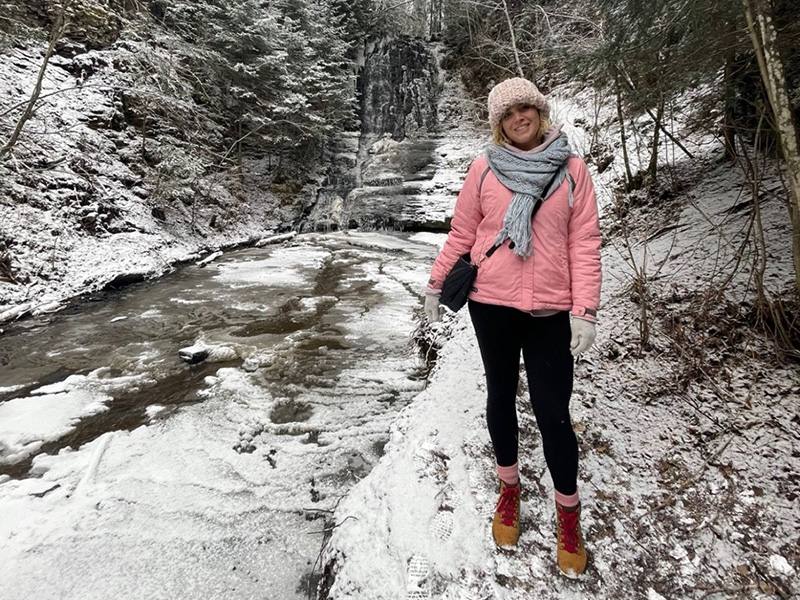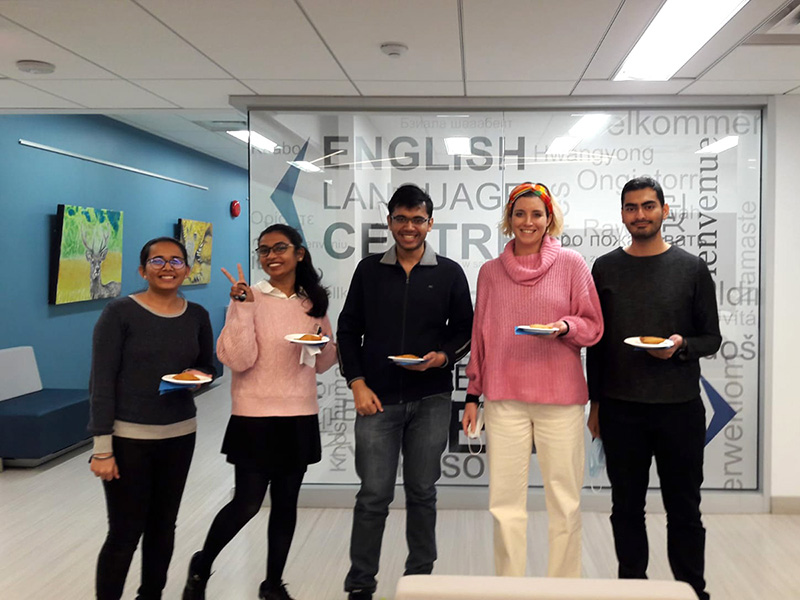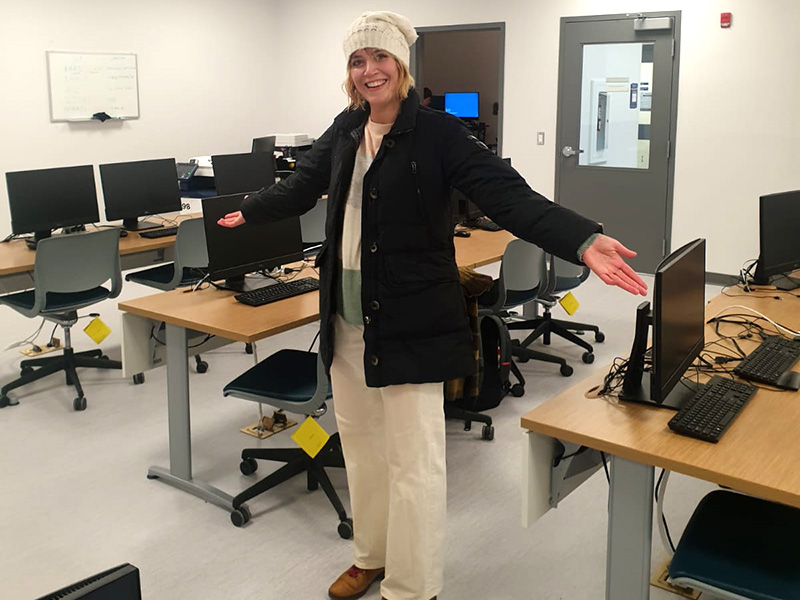
PhD Student Erica Capecchi investigates far-right groups and their use of social media.
One year ago, in this period, I was about to complete my placement at the Faculty of Computer Science at Lakehead University, Thunder Bay, Canada. This incredible opportunity arose after being awarded with the UK-Canada Globalink Exchange Programme, sponsored by UKRI and MITACS. The main aim for this placement was developing part of my PhD research with the help and support of people working in Computer Science.
For those who do not know me, I am a SWWDTP2 PhD based at Bristol University, in the School of Modern Languages, co-supervised by John Foot and Kevin Passmore (Cardiff University). My research project investigates the aesthetics of contemporary far-right groups and the propaganda strategies developed for their social media communication. The focus is on the current Italian political scene, however, in my research I draw comparisons with the international arena, considering the reach of what has become a global far-right network.
Compared to my first research proposal, my PhD project has evolved and expanded significantly, as well as some of my research questions. From paying attention to smaller neo-fascist groups, my curiosity drove me to dig deeper in the reasons why radical instances supported by these minor organisations became normalised and accepted in the mainstream.
I became devoted in getting a better understanding of the process that facilitated the popularisation of leaders supporting radical views, referrable to an underlying neofascist and extreme right culture, in national public and political debates. In my thesis, I argue that in this process aesthetics plays a central role. I draw from the concept of political aesthetics as theorised by Jacques Rancière which provides a different perspective on ‘aesthetics’ as compared to our general and traditional understanding of it, linked primarily to the interpretation of beauty within artistic contexts and debates.
My research draws from the concept of aesthetics as ‘scientia cognitionis sensitivae’ (science of sensory cognition) but rather than applying this to the perception of beauty, it extends it to the perception of human experience. Aesthetics is thus understood as a domain of sensory and perceptive experience that plays an essential role in shaping the way we, as human beings, interpret our surrounding world and reality. It would be too long to expand on the implications of this approach and how it applies to politics and social media communication in depth.
For the sake of context, I think it is enough to point that my research investigates the ways today’s far-right movements and politicians make use of aesthetics and aestheticised strategies to influence the way potential voters see and interpret current facts and events. Here is where the analysis of social media platforms kicks in, having become the main mediums used by online users to access information, and by politicians to promote their agendas. I argue that considering the centrality of social media communication in influencing today’s socio-political dynamics, is essential to develop a broader understanding of the relationship between the aesthetic and the political, its evolution, and the ways it interacts with people’s daily life experiences.
The project I developed at Lakehead University aimed exactly at delving deeper in the social media aspect of my broader PhD research with the vital support of researchers in computer science. Specifically, the focus of the project has been generating, collecting, and analysing new and original data drawn from Facebook and Twitter pages of mainstream Italian far-right movements and respective leaders.
The data we retrieved during my visiting period support my theories around the persuasive potential of far-right aestheticised communication on social media. They play an essential role in informing the discussion I develop in my PhD thesis concerning the possibilities for far-right narratives to impact today’s public and political debate as well as recruit and mobilise new followers and potential voters.
Reflecting the broader aims of my PhD research, my placement project ought to bring together research methodologies in the areas of the arts and humanities and computer science for the development of cross-disciplinary methods applied to the investigation of today’s society issues and challenges. In the coming sections, I briefly go through the practical difficulties I had to face trying to bridge two completely different disciplines and approaches.
Destination Thunder Bay
I left for Thunder Bay at the end of September 2021, for three months visiting period. After all the difficulties caused by the COVID-19 pandemic, I was super-excited about the idea of travelling again for research. The pandemic, however, was still not defeated yet and in fact continued to cause disruptions and delays. For this reason, getting ready for my research trip has not been a piece of cake, especially as I needed to rethink and adjust my plans several times.
My initial idea indeed consisted of heading to Canada in the summer. According to my plans, I would have enjoyed my stay immersed in the stunning Canadian nature without the risk of ending up buried in the snow at -40°. However, due to uncertainties about the re-opening of Canadian borders to international travellers I had to postpone my trip to the autumn term, which meant getting mentally ready to face the great Canadian cold. My survival strategy consisted essentially of filling up two large suitcases with all my warmest winter clothes, including my old and glorious snowsuit. After sorting all the bureaucratic stuff out, I could book my flights and finally let the adventure begin.
Now I guess you are wondering where exactly Thunder Bay stands on the map of Canada. Good question. Shortly, the city is quite central, in an area of Canada that counts more bears than human beings, on the Western shore of the massive Lake Superior. It is in Ontario, the same province of Toronto, however, the two cities are anything but close to each other. Just to give you an idea, travelling from Thunder Bay to Toronto in a reasonable amount of time requires a couple of hours flight (like London to Florence, basically). Around Thunder Bay there is nothing. Literally, nothing. The closest Canadian city, Winnipeg, is at around 6-hour drive West, whilst 5-hour drive South you may find the border with Minnesota (US).
Thunder Bay is one of the most populated urban centres in Western Ontario and has a rich history to tell. Its current outlook is the result of an amalgamation occurred in 1970 between Fort William and Port Arthur, the two main settlements established in the area as a product of European colonisation. This seems to be one of the reasons why Thunder Bay does not have a ‘true’ city centre, with its amenities spread all over the urban territory.
The area featuring city vibes from the perspective of a European traveller is the late Port Arthur, hosting a nice variety of restaurants, shops, cafes, and bars. From the Marina Park spot, facing Lake Superior, it is possible to admire the Sleeping Giant, a suggestive mountainous formation at the Southern end of the Sibley Peninsula, whose shape reminds of a mysterious creature laying asleep in the water.
The area is linked to indigenous Ojibway mythology and today hosts the Sleeping Giant Provincial Park. The lively Port Arthur is also characterised by a picturesque neighbourhood called Little Finland, hosting Finnish shops and cafes which are part of the cultural heritage left by Finnish immigrants who arrived in Thunder Bay at the end of 19th Century. Other than Little Finland, the city’s multicultural appeal unfolds also in the presence of a variety of ethnic communities including Indian and Italian.
Researching at Lakehead University

With my lovely DataLab colleagues, having a break with a delicious Indian treat kindly offered by the International Students Centre at Lakehead University. November 2021
After a first weekend in Thunder Bay filled up with a fair amount of (dis)adventures, I finally went to meet my collaborators, including my host supervisor, Dr Vijay Mago. Everyone has been very kind and welcoming to me and this helped me a lot with settling in. On my first day I started familiarising with my new working environment, including the laboratory (DataLab) and the University facilities in general. I was very excited by the idea that I was going to work in a fancy brand-new building, the Science and Engineering Centre.
I confess I felt a bit of an alien for a while in my new working space. The sense of strangeness to the world of computer science haunted me for some time. Despite I studied social media since the beginning of my PhD, I never had the possibility to explore the technical and practical end of these platforms before, which was exciting but also quite intimidating. Finding myself working with people who speak a completely divergent language from my humanistic background has been a challenge but also a great source of motivation. It pushed me to get out of my comfort zone to expand my horizons and develop a deeper understanding of interdisciplinary research.
For the reasons above, my work at DataLab has not been always straightforward and it entailed some significant bumps. However, I was prepared for challenging times, especially considering that I was at my first experience directing a research team independently and in a completely different discipline. Most of all, I was aware that it would have not been easy to build a smooth dialogue with people working in an antithetical terrain compared to a humanities’ researcher with a background in history of art like me.
On top of this, I also had to deal with existing cultural barriers between different academic schools and traditions (British and North American) which initially I did not consider at all, but I realised being something to take into account. On this note, it seemed to me that PhDs and master students in North America are even more pressured for publishing papers and research outcomes during their studies, and often from the very beginning. I am not sure whether this is specifically a computer science thing, or it applies to all the disciplines.
As far as I understand, however, the pace of research in computer science is strictly linked to the ultra-fast evolution of technology which urges scholars and academics to publish quickly and a lot to avoid being left behind. Standard academic competition then does the rest.
One of the main issues I had to address very soon with my supervisor concerned indeed the expectations and the pressure he put on me for writing a paper after just a couple of weeks from the beginning of my placement. From my point of view, at that time I felt like I was still trying to settle and figure out what exactly was going on, so I was way far from being able to think at something to write for a new paper. This also because I did not have any research results to discuss yet, it was too early, and this made me feel disoriented.
In general, it was not easy to let my collaborators understand the substantial difference between research approaches of humanities and social sciences, generally based on qualitative and discursive methods, versus those implemented by computer scientists, based essentially on fast paced quantitative data processing.
At times I felt like there was some underlying prejudice or scepticism towards my expertise and methods, especially when confronting my collaborators and supervisor. Despite the degree of challenge implied, however, we eventually managed to find ways to bridge some of the gaps in our approaches. I must admit that this entailed quite a lot of discussion, confrontation, and redefinition of the aims and objectives of the project, but it has been very formative for my growth as a researcher and academic.

Even going to work became a real challenge at some point. That day me and my colleague Amir decided to fight the storm and head to the office. We got there soaked, and nearly frozen.
As mentioned earlier, the main reason for me to undertake this placement was my interest in gaining better knowledge and understanding around the strategies for collection and interpretation of quantitative data to support the discussions I develop in my PhD thesis. My research at Lakehead University revolved essentially around data collection, analysis, and monitoring of the activity of mainstream Italian far-right movements and leaders on Facebook and Twitter between 2017 and 2021. During the research and data collection process we had to deal with a lot of constraints and disruptions (many of which unexpected) including technical, interpretative, but also ethical ones.
We also had to deal with a certain amount of disappointment deriving from the impossibility to get the results we expected. The most challenging elements concerned the development of a strand of analysis aimed at identifying and classifying the main topics addressed by Italian far-right politicians on Facebook and Twitter, also known as ‘topic modelling’. Another major struggle was the development of emotion and sentiment analysis of the contents shared by far-right politicians and activists online.
Among the elements we did not consider initially as potentially problematic, there has been the role played by language barriers: during our research we found indeed that the few existing datasets in Italian language are not accurate enough to train computer models aimed at analysing data drawn from social media. This was a major limit that in the end prevented us to develop both our topic modelling and sentiment analysis despite all the efforts and time spent in finding feasible methods and solutions.
Conscious that research can be sometimes very frustrating, especially when results do not meet expectations, I think that contributing to shed light on this limitation is still an important achievement, and I hope it may inspire other researchers in this field finding new ways to fill this gap.
Overall, the wide range of new skills and knowledge gained through this placement opportunity went way beyond my expectations. Among these, communication, project management, and networking have improved significantly. Finding ways to effectively communicate my research approach, aims, and contents to a non-expert audience, has been an incredible ‘gym’ for my professional development. Furthermore, I could get hands on experience in data analysis and social media analysis, and I could venture new research areas such as computational social science, which I wish to explore further in the future. In the end, the results of the analysis pursued with my collaborators were good and satisfying enough despite some pieces went missing.
Among the most significant outcomes of our three-months data collection there is the close evaluation of the engagement rate engendered by far-right pages analysed. These results enable me to get a very close look to the increased level of participation registered by far-right leaders in the period analysed, and how their pages operate in synergy with other profiles considered (far-right parties and far-right leaning media outlets) to spread their messages more effectively. We also had a look at their political opponents to draw comparisons and provide evidence concerning my theories about the persuasive appeal of far-right aesthetics and propaganda outpacing their left-wing counterparts.
Currently, I am still working on the interpretation of these data which I confess being very challenging at times. However, I am looking forward to finalising an article I have been working on since months which results to be very timely according to the recent developments in Italian politics. The election of Giorgia Meloni, leader of the far-right party Brothers of Italy, as Prime Minister in September 2022 may be interpreted indeed as the natural outcome of a situation that in Italy, but I would say in Europe at large, has seen far-right forces on the rise in the last ten years.
Friends in Thunder Bay
I want to wrap up spending some words about my time in Canada outside of the academic environment. My permanence, that felt a bit lonely and isolating at times, has been lightened up by some truly lovely friends. I made a lot of beautiful and unforgettable memories with them all which I will always keep with me. I feel blessed for having had the opportunity to get to know an incredible variety of cultural backgrounds and traditions. Special thanks to my friend Amir who introduced me to Persian food, a true illumination. If among those who are reading this post there is someone who never tried Persian, please do, I promise you will never regret it.
I also had my first canoeing experience ever in Thunder Bay, which was surprisingly exciting. I enjoyed it very much going out for a short paddle in the cold waters of Lake Superior. Unfortunately, I could not go skiing as the first intense snow started to fall towards the end of my stay, which is a shame because I would have truly loved it. Well, if I could have ever remembered how to stand still on a pair of skis, but that’s another story.
Towards the end of October, I also managed to go for a weekend trip to Toronto, and it was great. I loved exploring the city and get immersed in the vibrant life of its neighbourhoods. Once there, I also took the opportunity to visit the Niagara Falls, one of the best experiences of my life.

A view of Toronto’s skyline from one of the little islands facing the city from Lake Ontario. October 2021
I was surprised that until mid-November the weather had been so gentle, with temperatures going not too drastically below zero (just -10 to -15). Well, just the time to have this thought as in early December a snowstorm dropped the temperature to -23°C, perceived -31°. How does that feel? Well, someone says that after -15° you cannot feel the difference. What I can say is that when going out, the few body parts remaining uncovered got instantly frozen: I have been afraid of losing nose and eyelashes a few times. Fortunately, the big cold struck just a couple of weeks before the end of my stay because otherwise I would have probably ended up hibernating with bears.
Okay, I shall stop here although there would be much more to say about this incredible experience. I hope you may find my story intriguing enough to get some inspiration to be adventurous and go for research trips overseas, and maybe apply for the UKRI-MITACS Global Exchange Programme. Despite highs and lows, my period in Canada has been memorable from both a personal and professional perspective.

Rare footage of an academic enjoying the snow at -20° right before hibernation. Lakehead University, Thunder Bay Campus, December 2021
I learned a lot of new things concerning my work as a researcher, I could cultivate my personal growth and strength, and I had the opportunity to significantly expand my research network on an international scale. I am currently planning to return to Canada in spring/summer 2023, this time in Toronto, to start new collaborations around far-right, social media, and misinformation, and work on the development of the last chapter of my PhD thesis. Wish me luck!
To the next adventure!
Erica
Categorised in: Student Blogs